Children in Gaza are dying of cold as winter temperatures drop

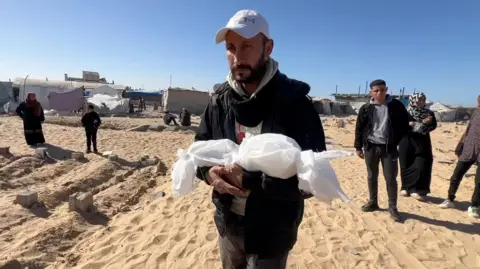 BBC
BBCSila was less than three weeks old when her mother Nariman noticed that she was not moving.
“I woke up in the morning and told my husband that the child was not moving. He uncovered his face and found it blue, biting his tongue, blood coming out of his mouth,” said Nariman al-Najmeh.
In their tent on the beach in southern Gaza, Nariman sits with her husband, Mahmoud Fasih, and their two young children – Rayan, four years old, and Nihad, two and a half years old.
The family says they have been expelled more than 10 times during the 14-month war.
“My husband is a fisherman, we come from the north and we leave with nothing but we do it for our children,” said Nariman in an interview with a freelance cameraman working with the BBC. Israel prevents international media from entering and working freely on the ground in Gaza.
“When I was pregnant, I was thinking about how I would get clothes for the baby. I was very worried because my husband does not have a job.”
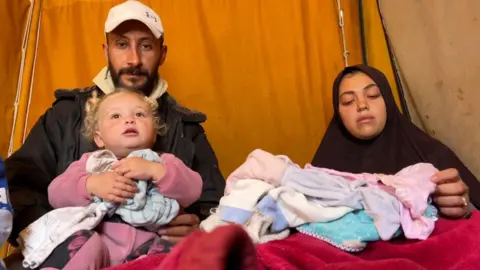
In the 20 days of his life, Sila’s home was a small and overcrowded camp in the al-Mawasi “humanitarian” area, where hundreds of thousands of Palestinians were displaced from the area ordered to leave by the Israeli army.
The area suffers from poor infrastructure and sanitation, as well as flooding caused by both rain and waves from the Mediterranean Sea.
“The cold is intense and intense. All night long, because of the cold, we are huddled together, huddled close to each other,” said Sila’s father, Mahmoud.
“Our life is hell. It is hell because of the consequences of the war, my family was martyred, and our situation is unbearable.”
Despite telling the residents to head for the area, the Israeli army has repeatedly attacked al-Mawasi while campaigning against Hamas and other armed groups in Gaza.
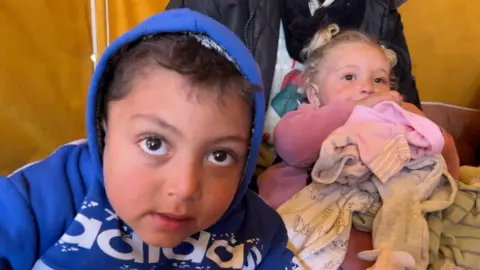
Sila’s death was not caused by bombing – but still by the punishing conditions that war imposes on civilians.
He is one of six newborns who have died of hypothermia in a fortnight in Gaza – where nighttime temperatures have dropped to 7C (45F) – according to local health authorities, who have also reported that thousands of tents have been damaged by the weather.
Nariman says Sila was born in a British hospital established in Khan Younis area.
“After giving birth… I started thinking about how to protect her milk, diapers. Everything I could find I found with great difficulty.”
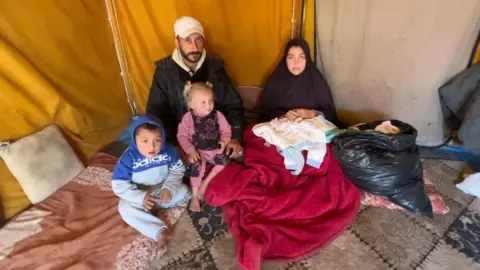
“I never thought that I would give birth and live in a tent, in such cold and cold weather, we were dripping with water. The water was leaking from the tent, and it poured on us. Sometimes we had to run away from the water – ” because of the child,” said Nariman.
Nevertheless, Silas was born without problems.
“His health was good, thank God, Suddenly, he started catching cold,” said Nariman. “I saw that he was sneezing and seemed to be sick from the cold, but I did not expect that he would die from it.”
Sila was admitted last Wednesday to Nasser Hospital in Khan Younis, where Dr. Ahmad al-Farra, director of the pediatric department, said he suffered “severe hypothermia, which led to the cessation of vital signs, cardiac arrest, and finally death”.
“[On the previous day] Also, two cases were brought in: one was a three-day-old baby and the other was less than a month old. Both cases involved severe hypothermia, which led to death,” said Dr. Farra.
Children have an underdeveloped way of maintaining their body temperature and may develop hypothermia easily in a cold environment. Babies born prematurely are at greatest risk, and Dr Farra says doctors in Gaza have seen an increase in the number of premature births during the war.
Mothers also suffer from malnutrition, leaving them unable to adequately breastfeed their children. There is also a shortage of infant formula because humanitarian aid deliveries are restricted, according to Dr. Farra.
Then on Sunday, another, painful case.
Outside the al-Aqsa hospital in central Gaza, a second local BBC cameraman met Yehia al-Batran, who could not contain her grief as she carried her dead child, Jumaa. Like Silas, he was only 20 days old and was green from the cold.
“Touch him with your hand, he is cold,” said Yehia. “All eight of us don’t have four blankets between us, what can I do when I see my children dying in front of me.”
“These preventable deaths have exposed the dire and deteriorating conditions facing families and children across Gaza,” Unicef regional director Edouard Beigbeder said in a statement on Thursday.
“With temperatures expected to drop significantly in the coming days, it is sad that so many children’s lives will be lost due to the brutal conditions they are enduring.”
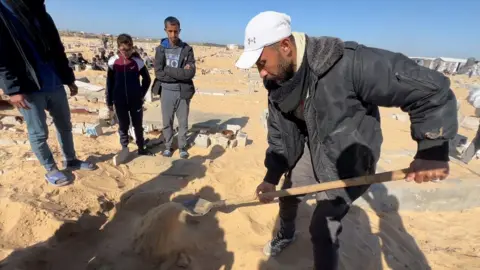
Under the sound of Israeli drones flying ahead, Sila’s father Mahmoud carried his body from Nasser Hospital to the temporary cemetery in Khan Younis. There, he dug a small grave in the sand.
After putting Sila to sleep, Mahmoud consoled Nariman.
“Her children are sick, they are tired. We are all sick. Our chests hurt, and we are suffering from cold and rain,” said Nariman. “If we don’t die of war, we die of cold.”
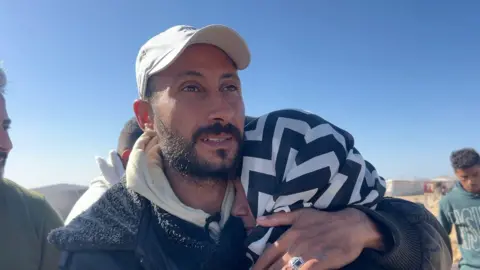
Source link




